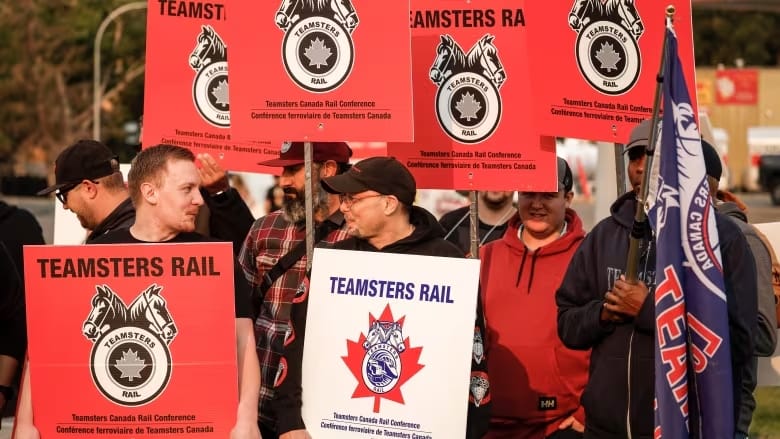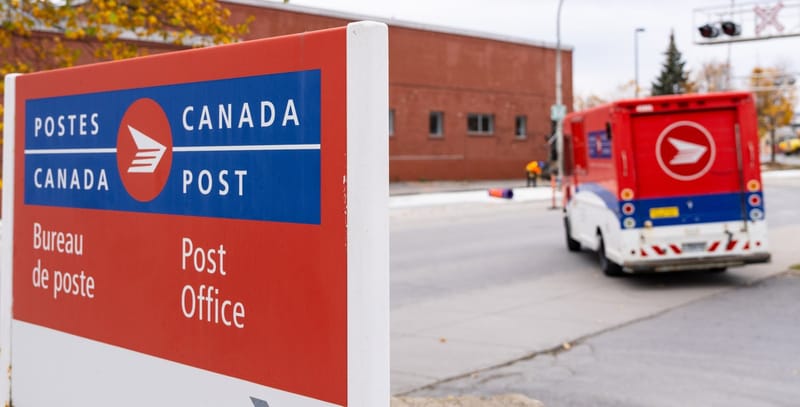Teamsters union serves CN Rail with 72-hour strike notice as CPKC stoppage ongoing
The notice indicates that the union does not view the ongoing issues between the railway and the Teamsters as "insurmountable" and is open to negotiating with the company to avoid any "further work stoppage."

The Teamsters union has issued a 72-hour strike notice to Canadian National Railway (CN), just hours after announcing the removal of picket lines and the return of workers to their jobs.
"This letter serves as official notice to the company of our intention to withdraw the services of our combined membership of approximately 6,500 members," stated the notice sent to CN on Friday morning by the Teamsters Canada Rail Conference.
The notice indicates that the union does not view the ongoing issues between the railway and the Teamsters as "insurmountable" and is open to negotiating with the company to avoid any "further work stoppage."
Speaking in Calgary, François Laporte, the president of Teamsters Canada, criticized the company's demands, stating they would have violated the union's collective agreement. He emphasized that the union's priority is to ensure "decent and reasonable working conditions" for its members.
"We believe in fair and honest bargaining, and that's what we want—fair and honest bargaining with the company," Laporte said.
Meanwhile, the work stoppage at Canadian Pacific Kansas City (CPKC) continues, pending an order from the Canada Industrial Relations Board (CIRB).
After months of increasingly tense contract negotiations, Canada's two largest railways locked out workers when they failed to reach agreements with the union by Thursday's deadline.
The unprecedented work stoppage led federal Labour Minister Steven MacKinnon to refer the dispute to the CIRB for binding arbitration.
Union representatives and CPKC officials met with the board on Thursday and are scheduled to meet again on Friday.
CPKC expressed willingness to discuss the resumption of service during the CIRB meeting, but the union declined, opting instead to challenge the constitutionality of MacKinnon's directive.
Both CN and CPKC locked out a total of 9,300 engineers, conductors, and yard workers just after midnight on Thursday, following months of increasingly fraught labor negotiations. Simultaneously, 3,500 CPKC workers went on strike.
Jonathan Abecassis, CN’s director of public affairs and media relations, stated that without an agreement or binding arbitration, the company "had no choice" but to lock out employees. CPKC also called for binding arbitration, accusing the union of making "unrealistic demands."
Less than 17 hours after the lockout began, MacKinnon announced his intention to intervene using his powers as labor minister. Section 107 of the Canada Labour Code allows the government to refer a labor dispute to the CIRB to find a resolution.
Laporte expressed the union's discontent with the minister's actions on Friday.
"The best way to secure a contract is at the bargaining table," he said. "We don’t believe in letting a third party decide our working conditions."
Laporte added that railway operations are complex, and the union, along with the company, understands what is necessary to provide workers with fair conditions. He emphasized the union's commitment to using its "constitutional right" to fight for a fair deal.
"We are here, and we are going to stay here," he declared.
The ongoing conflict has caused significant disruptions to cargo and commuter services, increasing pressure from industry groups and provincial governments to find a resolution.
According to the Railway Association of Canada, the companies transport goods worth a combined $1 billion daily. Many shipments were preemptively halted to prevent cargo from being stranded.
The impasse is affecting tens of thousands of commuters in Toronto, Montreal, and Vancouver, where rail lines run on CPKC-owned tracks. Without traffic controllers to manage them, passenger trains cannot operate on those rails.
Industries impacted by the work stoppage include agriculture, mining, energy, retail, automaking, and construction. U.S. railways have also had to divert Canada-bound shipments due to the situation.
Shippers in the United States also depend on Canada’s two main railways, which have tracks extending to the Gulf of Mexico and, in CPKC’s case, to several Mexican ports.





